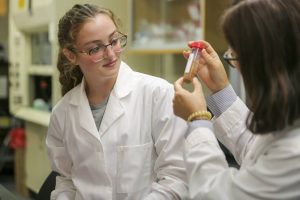Phelipanche aegyptiaca, a parasitic plant commonly known as Egyptian broomrape, has been wreaking havoc on farmers’ crops in Africa and Mediterranean Europe since the ‘90s, and, in 2014, it found its way to the United States when it was discovered in a crop of tomato plants in northern California. The plant is difficult to detect and eradicate once it takes hold, but one University of Missouri researcher hopes to change that before the plant has the opportunity to spread to the Midwest.
“In European and African countries, this weed is just decimating their lands,” said Soyon Park, assistant professor of plant science and technology at MU. “Farmers in Africa are abandoning their lands because there is no way to control this root parasitic plant. We need to be prepared before it is too late.”
Park explained that as a root parasitic plant, the dust-particle-sized seeds of Egyptian broomrape first make a physical connection between themselves and their favorite host plants — broadleaf vegetables and field crops — underground on the host’s root structure. From there, it steals nutrients and any other resources it needs to thrive from its host causing the host to lose energy that it would otherwise invest in producing fruits, beans or other harvestable end-products. The farmer won’t know the weed is growing in their crops until harvest when they have low yields followed by the plants finally emerging from underground and displaying their tell-tale white flower clusters – each of which contains thousands more seeds poised to ravage the next year’s crops.

To date, there is no known mechanism to control this parasitic plant. Park began her quest to find one a year ago when she was awarded a CAFNR Joy of Discovery Seed Grant. The Joy of Discovery Seed Grant Program supports nascent, collaborative, multi-disciplinary research with the goal of developing a competitive proposal for federal funding.
“The Joy of Discovery Seed Grant Program has proven to be a remarkable tool for our researchers to do preliminary research that drives innovation to solve real-world problems,” said Shibu Jose, associate dean of research for the College of Agriculture, Food and Natural Resources. “Dr. Park’s project is a wonderful example of the research done right here in CAFNR that will have a very tangible impact on agricultural producers not just in Missouri or the Midwest but throughout the world.”
With that Joy of Discovery Seed Grant, Park did some preliminary research that led to a promising potential solution to ward off Egyptian broomrape.

“This study is very beginning to understand host and parasitic plant interaction. With that the best control solution is a parasite-resistant crop,” Park said. “If we know what is the key gene to the parasitic plant, we can make the whole plant resistant.”
Based on her Joy of Discovery preliminary research, Park believes this key may lay within the host plant’s production of growth hormones.
“Just like humans, plants have growth hormones,” Park said. “Plants use growth hormones to grow big and healthy, but they also use growth hormone to protect themselves.”
Now, Park is working with funding from a three-year, $749,879 USDA National Institute of Food and Agriculture (NIFA) grant to expand on her findings.
According to Park, the NIFA grant has three aims — finding genes that respond to Egyptian broomrape, screening mutant tomato and Arabidopsis – a type of mustard plant and developing crops resistant to Egyptian broomrape. Findings from this project will be applied to increase host resistance against all members of the genera Phelipanche, Orobanche, and Striga.
In the United States, all members of the genera Phelipanche, Orobanche, and Striga are Federal Noxious Weeds that – despite measures to prevent their introduction have invaded on multiple occasions and are currently found in localized infestations around the country. Phelipanche ramose, which is closely related to P. aegyptiaca, the subject of this research project, has established populations in six states including California, Illinois, Kentucky, New Jersey, Texas, and Virginia. APHIS predicted that about 65% of the United States is suitable for the establishment of P. ramosa. As a result, P. ramosa and P. aegyptiaca are ranked in “high-risk parasitic weeds” and “fast-spreading parasites”.
“The goal is to eventually develop commercial applications in the future” Park said.